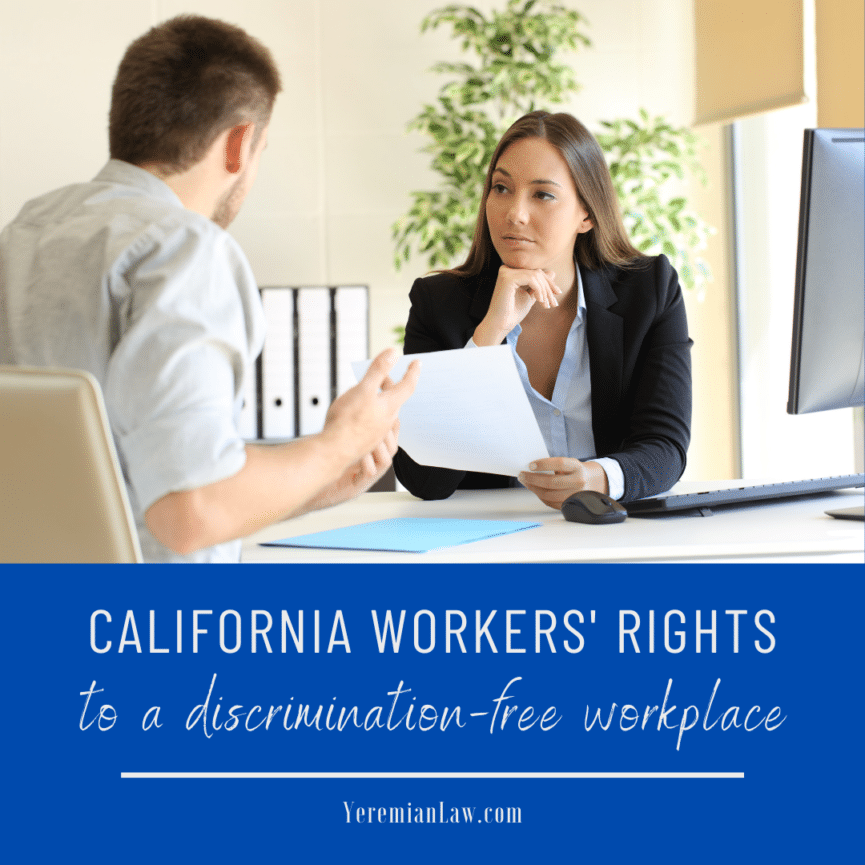If you are a worker in California, there are a number of laws that protect you against discrimination. In fact, all California workers have the right to a discrimination-free workplace. That’s true regardless of your industry, your immigration status and the skill level your job requires. This guide explains California workers’ rights to a discrimination-free workplace, outlines the laws that prohibit discrimination, and gives you the guidance you need if you’ve been the victim of discrimination.
Laws in California That Prohibit Workplace Discrimination
There are four major laws that prohibit workplace discrimination in California:
- The Fair Employment and Housing Act, or FEHA. Every company in California that has five or more full time employees is required to follow this law. FEHA Prohibits employers from using discriminatory behaviors in all business practices, including advertising job openings, creating working conditions, hiring and firing workers, and extending benefits to workers.
- Title VII of the Civil Rights Act of 1964. This is a federal law, but it still applies to California employers. This law prohibits discrimination based on race, color, age, religion, sex, disability and national origin.
- Americans With Disabilities Act, or ADA. Like the Civil Rights Act, the ADA is a federal law. It prohibits discrimination on the basis of disability, and it applies both to people with a disability and those in relationships with people who have a disability.
- Equal Pay Act. The Equal Pay Act Requires employers to pay workers equally, regardless of gender. However, the pay doesn’t have to be exactly equal; instead, it must be substantially equal. That means “pretty close.”
Related: California workers’ rights to be paid fair wages for work
Areas Prohibited From Discrimination Under Federal and State Laws in California
California law extends protections farther than federal law does. For example, federal law does not provide protections specifically for genetic information, but California law does. When there is a difference between the protections offered by state and federal laws, courts defer to the law that provides the highest level of protection for the worker. In many cases, California judges are forced to rely on California law rather than federal law; that’s because California laws typically provide stronger protections for workers than federal laws do.
- Age
- Ancestry
- Color
- Gender
- Gender expression
- Gender identity
- Genetic information
- Marital status
- Medical condition
- Mental disability
- Military or veteran status
- National origin
- Physical disability
- Race
- Religious creed
- Sex
- Sexual orientation
Related: Do you have the right to a safe workplace?
What Does Workplace Discrimination Look Like?
Workplace discrimination can take many forms. You may experience workplace discrimination before you’re hired, when you’re already working for a company, or when your employment is terminated. Sometimes employers engage in discriminatory practices involving:
- Job advertisements
- Applications, job screening and interviews
- Hiring, promoting, transferring or terminating and separating employees
- Working conditions
- Participation in an employee organization or union, as well as participation in a training or apprenticeship program
Workplace discrimination can include unfair treatment, harassment, denial of reasonable accommodations, improper questions about information that should remain private, or even retaliation after a worker complains or works with investigators on an existing complaint.
For example, because employers are not allowed to discriminate based on age, asking an applicant age on a job application may be a discriminatory practice. Likewise, refusing to hire anyone but Christians, preventing a gay team member from working directly with customers, or refusing to promote someone because they’re African-American are all discriminatory practices… in most cases.
Please note that we said in most cases. That’s because sometimes, if a business has a bona fide need to do something that looks like discrimination, it can be lawful. For example, a women’s shelter may choose to hire only women; a religious school may choose to hire only teachers who belong to that particular religion.
Related: What is the Whistleblower Protection Act, and does it apply to you?
Do You Need to Talk to an Attorney About California Workers’ Rights to a Discrimination-Free Workplace?
If you believe an employer has discriminated against you because you are part of a protected class of people, we may be able to help you. We’d like to invite you to call our office at 818-230-8380 or fill out the form below to schedule your free consultation. Our attorneys may be able to give you the help you need.




